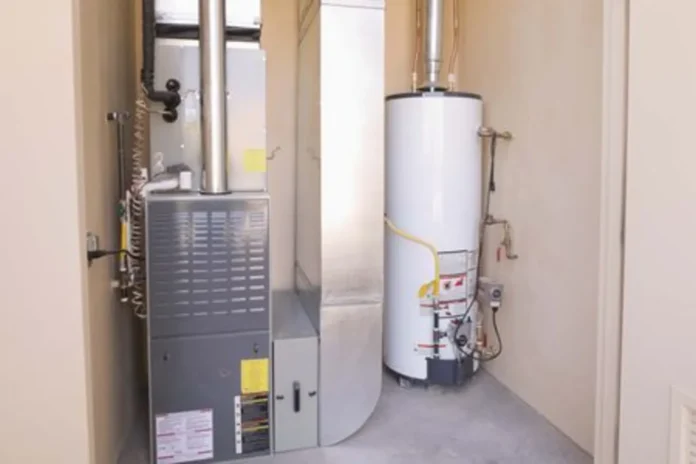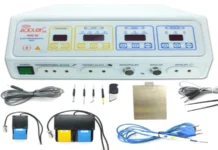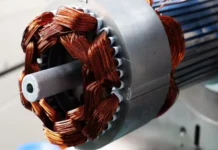A power vent water heater is a type of water heater that uses a fan or blower to vent the exhaust gases outside.
As homeowners, we rely on hot water for daily tasks like bathing, cooking, and cleaning.
But have you ever stopped to think about how your water heater actually works?
In this comprehensive guide, we will explore everything you need to know about power vent water heaters.
We will cover all the essential information to help you make an informed decision about your home.
So, whether you are looking to upgrade your existing device or simply curious about this innovative technology, read on to discover the ins and outs of power vent water heaters.
An Overview Of A Power Vent Water Heater
Unlike traditional heaters that rely on natural draft or gravity to remove exhaust gases, this type provides more installation flexibility.
This is because you can install it in areas without access to a chimney or vertical venting.
The power vent mechanism in these water heaters creates a positive pressure system, allowing the unit to push the exhaust gases through a dedicated vent pipe.
Furthermore, you can run its pipe horizontally or vertically, giving homeowners more options for installation locations.
One of the main advantages of a power vent water heater is its efficiency.
By using a fan to assist with venting, these water heaters can achieve higher energy efficiency ratings compared to conventional models.
This means they can heat water more effectively while consuming less energy, resulting in potential cost savings on utility bills.
In addition to their efficiency, power vent water heaters are also known for their safety features.
The positive pressure system prevents back-drafting, ensuring that combustion gases are properly vented outside and not released into the living space.
This helps to protect the occupants from potential carbon monoxide exposure.
When considering a power vent water heater, it’s important to note that they require access to electrical power for the fan or blower to operate.
This means that a power source should be available near the installation location.
Overall, a power vent water heater is a reliable and efficient option for providing hot water in homes where traditional venting methods may not be feasible.
Its ability to vent horizontally or vertically, coupled with its safety features and energy efficiency, make it a popular choice for homeowners looking for a practical and versatile water heating solution.
How Does A Power Vent Water Heater Work?
Unlike traditional water heaters that rely on natural draft to remove the byproducts of combustion, you can install a power vent water heater in areas where a vertical venting system is not possible or practical.
So, how exactly does it work? It starts with the combustion process.
When the water heater is turned on, a burner ignites and heats the water inside the tank.
As the fuel burns, it produces hot combustion gases and byproducts such as carbon monoxide.
In this device, there is a fan or blower connection at the top of the unit.
This fan creates a positive pressure that pushes the combustion gases through a vent pipe and out of the house.
You can also direct the vent pipe horizontally or vertically, depending on the installation requirements.
The fan also draws in fresh air from outside to aid in the combustion process. This ensures that there is a constant supply of oxygen for efficient fuel burning.
The incoming air and outgoing gases are kept separate to prevent any safety hazards or contamination.
One of the key benefits of a power vent water heater is its versatility in installation options.
Since it does not rely on natural drafts, you can install it in basements, attics, or even in rooms without direct access to an exterior wall.
This makes it a popular choice for homeowners with limited space or specific location requirements.
It is worth noting that a power vent water heater requires access to electricity to power the fan or blower.
This means that in the event of a power outage, the unit may not operate until electricity is restored.
Overall, a power vent water heater offers a reliable and efficient alternative to traditional water heaters.
Advantages And Disadvantages Of A Power Vent Water Heater
A fan or blower is used in this type of water heater, a type of water heating system, to remove gases from the appliance.
This differs from traditional water heaters that rely on natural draft to remove exhaust gases.
Understanding the advantages and disadvantages of a power vent water heater can help you decide if it is the right choice for your home.
Advantages
One of the major advantages of a power vent water heater is its installation versatility.
Unlike traditional water heaters that require a vertical venting system, you can vent the power vent water heater horizontally.
This allows for greater flexibility in where the unit can be installed, making it an ideal choice for homes with limited space or specific venting requirements.
Another advantage of a power-vent water heater is its increased energy efficiency.
These units are designed to be highly efficient, often featuring advanced insulation and heat recovery systems.
This can result in lower energy consumption and reduced utility bills over time.
Additionally, a power-vent water heater eliminates the need for a chimney or flue.
This can be a cost-saving factor in homes that do not already have a built-in venting system.
It can simplify the installation process and reduce associated costs.
However, it is important to consider the potential disadvantages of a power vent water heater as well.
Disadvantages
One of the main drawbacks is the noise coming from the fan or blower during operation.
While manufacturers have made significant advancements in reducing noise levels, some homeowners may find the sound disruptive.
Especially, if the unit is located in a living space or near bedrooms.
Another consideration is the reliance on electricity to power the fan or blower.
In the event of a power outage, a power vent water heater may not function, leaving you without hot water until power is restored.
This is something to consider if you live in an area prone to frequent power outages.
Lastly, the initial cost of a power vent water heater can be higher compared to traditional water heaters.
However, it is important to weigh this against the potential long-term energy savings and the benefits of flexible installation options.
Ultimately, the decision to choose a power vent water heater depends on your specific needs and circumstances.
Factors To Consider When Choosing A Power Vent Water Heater
There are various variables to consider when selecting a power-vent water heater.
Those factors help to ensure that you make the best decision for your unique needs.
The Size Of The Water Heater
First and foremost, you need to consider the size of the water heater.
The size of the unit you choose will depend on your household’s hot water demands.
It is essential to determine the proper size to ensure that you have enough hot water for your daily activities.
The Energy Efficiency Of The Power Vent Water
Another important factor to consider is the energy efficiency of the power vent water heater.
Look for a unit that has a high Energy Factor (EF) rating.
A higher EF rating means that the unit operates more efficiently and will help you save on your energy bills.
The Installation Requirements
The installation requirements should also be taken into account.
Power-vent water heaters require a venting system that can safely and effectively remove the combustion gases from your home.
Ensure that you have the necessary space and the ability to install the required venting system before purchasing a power-vent water heater.
The Warranty And Maintenance Requirements
Additionally, it is important to consider the warranty and maintenance requirements of the unit.
Look for a water heater that comes with a substantial warranty period to protect your investment.
Also, check the manufacturer’s recommendations for regular maintenance to ensure the longevity and performance of your power vent water heater.
Your Budget
Lastly, don’t forget to consider your budget. Power-vent water heaters can vary in price.
Therefore, it is essential to determine your budget and look for a unit that falls within your price range.
Hence, it still meets your requirements for size, energy efficiency, and warranty.
Safety And Maintenance Tips
Safety and maintenance are important aspects to consider when it comes to owning a power vent water heater.
These tips will help you ensure that your power vent water heater operates efficiently and safely.
1. Regular Inspections
It is crucial to schedule regular inspections of your power vent water heater to identify any potential issues.
Look for signs of leakage, corrosion, or unusual noises. Additionally, check the venting system for any blockages or obstructions.
2. Ventilation
Proper ventilation is essential for the safe operation of a power vent water heater.
Ensure that the venting system is free from any debris, such as leaves or debris, which can obstruct the airflow and cause dangerous backdrafts.
Additionally, make sure that you install the vent according to the manufacturer’s guidelines to prevent the buildup of harmful gases.
3. Carbon Monoxide Detectors
Install carbon monoxide detectors in the vicinity of your power vent water heater.
This odorless and colorless gas can be produced by the combustion process and pose a serious threat to your household’s safety.
Regularly test the detectors to ensure they are functioning correctly.
4. Temperature And Pressure Relief Valve
The temperature and pressure relief valves are crucial safety features of your power vent water heater.
Regularly test this valve to ensure it is working correctly. If you notice any signs of leakage or malfunction, promptly replace the valve.
5. Sediment Flushing
Over time, sediment can accumulate in the tank of your power vent water heater, affecting its efficiency and potentially causing damage.
Regularly flush the tank to remove the sediment buildup. Refer to the manufacturer’s instructions for the recommended flush frequency.
6. Professional Maintenance
Consider scheduling annual maintenance by a qualified technician.
They will inspect and clean the burner, check for any gas leaks, and ensure all components are functioning correctly.
Professional maintenance can help prolong the lifespan of your power vent water heater and prevent costly repairs.
What Is A Power Vent Water Heater?: Frequently Asked Questions
Atmospheric Venting
The most popular form of water heater uses a technique known as atmospheric venting. The vent is made up of a vertical or upward-sloping vent duct that connects to a common vent.
Direct vent space heaters are essentially propane-fired combustion boxes that use external air to generate heat; any combustion gases are discharged straight outside your home through a tiny pipe through an exterior wall.
While modern water heaters are better engineered than earlier types, they nevertheless require routine maintenance to ensure their longevity. A gas water heater should last 8–12 years with regular inspection, draining, and flushing, whereas an electric water heater should last 10–15 years.
They are also said to be more energy-efficient because all of the fuel is used to heat the water, while the fan pushes dangerous gases out of your home. You also don’t have to be concerned about the water heater leaking carbon monoxide as a result of poor ventilation.
Power vents are a more efficient option since they are designed to use heat from the exhaust to heat water, saving electricity. Because of the lower exhaust temperatures, they enable PVC pipe, which is a less expensive and easier-to-build option than normal atmospheric vent metal piping.
My Final Thoughts On What Is A Power Vent Water Heater?
In conclusion, a power vent water heater is a great option for homeowners who need flexibility in the installation of their water heater.
With the ability to vent through a sidewall, these units can be placed in areas without access to a traditional chimney.
They are also ideal for homes with limited space or those that require longer venting distances.
Additionally, power vent water heaters are efficient and can provide hot water on demand, ensuring that you always have a reliable supply of hot water for your daily needs.
When considering a power vent water heater, it is important to take into account factors such as the size of your household, the available space for installation, and energy efficiency ratings.
Consulting with a professional plumber can help you determine the best model and size for your specific needs.
Investing in a power vent water heater not only provides convenience and efficiency but also contributes to a more sustainable and eco-friendly home.
I hope you have gotten a little bit closer to the Power Vent Water Heater of your dreams, so you can spend less time in front of a monitor and more time enjoying your Power Vent Water Heater.
I hope you found this review helpful.
Kindly share your thoughts with us by filling out the “Leave A Reply” form at the end of this page.
Further Reading And References
To read more informative articles like this, see the pages below:
The Best 6000 BTU Air Conditioners




